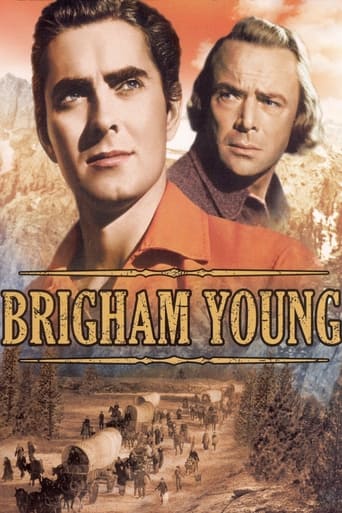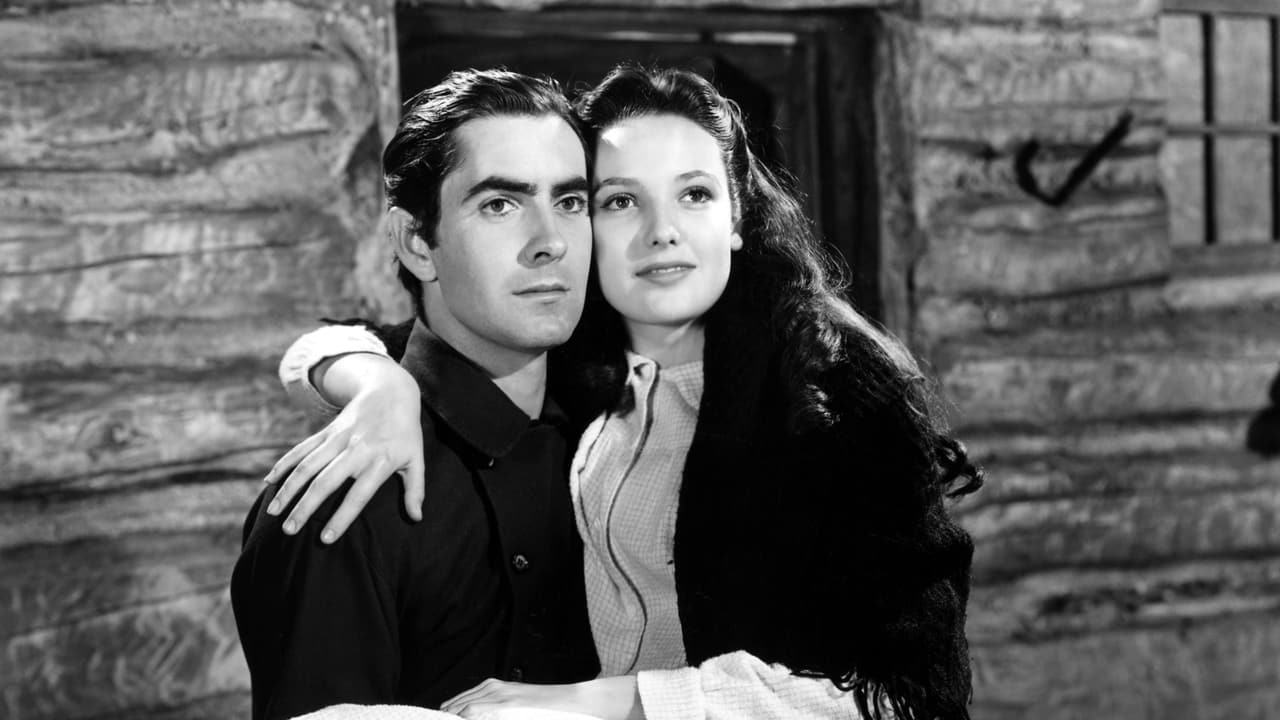funkyfry
Well, this is the first film I've reviewed since the IMDb removed the message boards. I might have just gone to the CFB and ranted over there for a while about all the film's negatives.... if you think I'm being too critical here, you know who to blame. There's now no space for discussion, and I just can give you my initial reactions.First of all, Dean Jagger is the worst possible casting choice to play Brigham Young. He has the sincerity -- too much of it -- but that's about it. I was affected viscerally, not so much by my distaste for Mormonism in general but just the way that he gave endless speeches that are all self-righteous and very flat. Jagger is earnest, and that's about his whole range of emotions. It's as if they had hired Alan Thicke to play Alexander the Great. Dean Jagger belongs as a frustrated dad on a sitcom, not as a religious visionary in an epic historical film. It sinks any possibility the film might have had. Tyrone Power and Linda Darnell aren't given much of anything to work with either, and their sections of the film often slow the proceedings down even more than Jagger's endless speeches (there's a bonus feature showing a still from yet *another* Jagger speech, so Zanuck must have realized he had too much of a "good" thing on the editing table). John Carradine seems like he walked out of another movie, and he cuts a truly dashing figure with long braided hair, pulling his pistols out in the courtroom. But even his character is a disappointment since it feels like he's built up for an action scene that never happens. I don't usually spend a lot of time criticizing a film for historical inaccuracy, but since what we're talking about here is a film that is essentially functioning as propaganda for the Church of LDS, I think that it would be irresponsible to let them get away with so many outright lies about Young. The film glosses over the issue of his multiple wives, only referring obliquely and only in the very last portions of the movie allowing any wives other than Mary Astor to be shown. There's even a few scenes, the one with Power and Carradine riding and joking about having 40,000 grandchildren (Carradine says, "I'm gonna do my part for the population" hardy harr harr), and another scene where Jagger's Young makes an analogy of women to having a huge chunk of tobacco -- is it too much for me to chew? These are terrible, offensive scenes that try to downplay and normalize the Mormons' awful patriarchy (women weren't allowed to marry 40 men, let's put it that way). Just as offensive is the way that the film tries to gloss over the violent relationship between Brigham Young, his Mormons, and the Native American inhabitants who he displaced and often murdered when he settled Utah. In the film, Young refers to the Great Basin Valley as a place "nobody would want to live" (actually many Native people were displaced when they moved there), and the film also shows a group of Native Americans welcoming the Mormons, and Brigham Young comparing himself as a refugee to the flight of Native Americans. This puts Young on the side of the victims, against the colonizers, when in fact he was a colonizer himself and a hardcore white supremacist. But the fact is, the movie stinks either way. The director, Henry Hathaway, has shot so much coverage that the film lacks any focus from that standpoint, and the whole thing just drags and drags on. The only parts of the movie that really have any punch are the very beginning with the mobs raiding the Mormon settlers, and the ending with the cricket swarm. The whole thing is basically, Cecil B. DeMille-lite. If it was a DeMille movie, at least it would have some internal movement. But this is a lot of dead weight hung around the skeleton of an epic. oh yeah one more complaint -- definitely not enough Vincent Price in this movie! Why didn't they cast Price as Brigham Young? Jagger is just exceptionally awful.
calvinnme
It must have been a difficult thing to make a movie in 1940 about the Mormons in the 19th century with polygamy being practiced by them at that time, but Daryl F. Zanuck gave it a try, even managing to get it past the production code and the censors of the time. He is definitely trying to parallel the trek of the Israelites from Egypt to the promised land headed by Moses with the Mormons traveling from Nauvoo to Salt Lake headed by Brigham Young. There are some colorful characters thrown in such as John Caradine's Porter Rockwell, a rather wild scout, who pulls his guns on a prosecutor during a trial so that Brigham Young (Dean Jagger) can have a chance to speak in Joseph Smith's defense, and the judge lets him get away with that?? Then there is also a romance thrown in with Mormon Jonathan Kent (Tyrone Power) and non-Mormon Zina Webb (Linda Darnell) slowly falling for each other as they travel across the continent with the Mormons. When Jonathan proposes marriage, Zina has reservations - first off, she is not a Mormon, and more importantly, she doesn't want to be the first of many Mrs.Kents. Her reservations were probably justified.There is even a bad guy in the (fictional) person of Angus Duncan (Brian Donlevy) who claims that Joseph Smith told him that he was to head the church in case of his death, and then causes trouble for Brigham Young every step of the way, including trying to get the Mormons to follow him to California rather than stop at Salt Lake. And yes, Angus is just like Edward G. Robinson's trouble making character in "The Ten Commandments", but remember, this film was made sixteen years before "Ten Commandments". The whole time, as Brigham makes decisions that effect the lives of all of the Mormons, he confides in wife Mary Ann that he is not sure that he is being led by God to make all of these decisions, so that he carries a burden of feeling that he could be misleading the others when he tells them to do this or that, but all the while his heart is in the right place. The film brings up some valid points to anybody that believes in God - How do you really know when He is speaking to you? How do you know a true prophet from a false one? I'm no expert on LDS history, in fact I'm not LDS at all, but if you want a rousing Western adventure that is a little different you might give this one a try. This film must have been somewhat convincing to non-Mormons as a realistic portrayal of what happened, because I distinctly remember this film being shown in elementary school back in history class when I was growing up in Texas! Do note that Dallas, Texas was probably lacking in large numbers of people who were neither a Baptist nor a Methodist back in 1967. Catch this one if you can. The performances are excellent even if the history may be a little off.
D H
I'm LDS, with a significant interest in history, and although this film was OK, and I enjoyed the cast, the story was inaccurate and somewhat glossy in many places.In contrast to some of the other reviews, I'd note that Joseph Smith was arrested on a legitimate charge. He destroyed a newspaper press and the papers in Nauvoo. Freedom of the press is protected in the US under the constitution, so he broke the law. Further, having read that edition of the Nauvoo expositor I find that although there is hyperbole within it the basis of its claims are founded in fact, revealing that Joseph taught polygamy long before it was openly announced. Having read Richard Lyman Bushman's 'Rough Stone Rolling', and Todd Compton's 'In Sacred Loneliness' Smith is also acknowledged by Church Historians to have married 11 women that were actually married to other men alive at the time - some of which he had sent away on missions before proposing to their wives whilst they were away serving. So if anything, this movie underplays it.Brigham Young, was a strong leader, and he did indeed establish SLC, and build a thriving community there. Our history is far more troubled and nuanced than is portrayed in this movie. The story did little to portray a well rounded view of the harsh reality both within and without the church.
J B Thackery
Mormons like myself generally love this movie for three reasons: 1) It does not persecute us; 2) It shows the historic significance of the Mormon movement; 3) The film itself is superbly acted and directed.HOWEVER, there are some major historical inaccuracies. For one thing, Joseph Smith never got a trial. He was murdered in jail by a mob of nearly 200. He turned himself in, despite false charges, in order to prevent a battle between the persecuting mobs and the persecuted Mormons. The young (pre-ghoulish)Vincent Price does a good job portraying the humble and kind Joseph Smith. For the most part, Dean Jagger portrays Brigham Young wonderfully. However, he was not in Illinois when Joseph and Hyrum Smith were martyred. He was serving a mission in Boston. But he and Joseph had long discussed that they would one day go to the Rockies, and that Brigham (an Apostle) would one day replace Joseph as Prophet.The film, for dramatic purposes, portrays Brigham as struggling for inspiration and revelation. All historic accounts of him reveal that he was one of the most inspired religious and social leaders of all time, and that he had perfect confidence in what he was doing.There is also an overemphasis on desenters within the thousands of Mormons who went west to Utah. There were some, but the majority loved Brother Brigham and felt inspired in what they were doing, which was leaving to build a home for peace and religious freedom.Also, the Mormons did not flee the day Joseph Smith was killed, nor did they leave in a hail of bullets. It was nearly two years before they actually left Illinois for Utah. They were also not a scruffy bunch as portrayed by a few of the actors, but for the most part were refined and benevolent people, not given to rowdiness.Despite all this, you still find the film on sale in Mormon bookstores.This is because it is overall a well-made film about an important part of America's make-up. By the way, Dean Jagger became a Mormon later in life. Actor Moroni Olson was a Mormon all his life, born in Utah, appearing in 100 feature films.


 AD
AD


